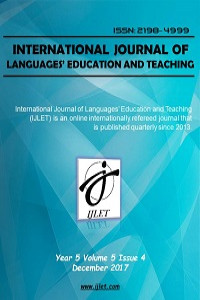Öz
Anahtar Kelimeler
Kaynakça
- Arnold, J. (1999) (Ed), Affect in Language Learning, Cambridge University Press, Cambridge.
- Arnold, J. (2006), « Comment les facteurs affectifs influencent-ils l’apprentissage d’une langue étrangère? », Ela. Études de linguistique appliquée, vol 4, n° 144, 407-425.
- Arnold, J. (2011): « Attention to Affect in Language Learning », Anglistik. International Journal of English Studies, 22/1, 11-22.
- Besse, H. (2009), « Pourquoi apprend-on encore le français en tant que langue étrangère? » Revue japonaise de didactique du français, vol 4, n°1, 9-25.
- Calvet, L.J. (2006), Towards an Ecology of World Languages, Polity Press, Cambridge
- Castellotti, V. & Moore, D. (2002), Représentations sociales des langues et enseignements, Conseil de l’Europe, Strasbourg.
- Cosnier, J. (2001), « L’émotion et les deux voies de la communication », Émotions, interactions et développement, 27-31.
- Dabène, L. (1994), Repères sociolinguistiques pour l’enseignement des langues, Hachette-livre, Paris.
- Denzin, N. & Lincoln, Y. (Eds) (2011), The Sage Handbook of Qualitative Research. London: SAGE Publications, Inc.
- Dewaele, J-M. (2015), “On Emotions in Foreign Language Learning in Use”, The Language Teacher, 39(3), 13-15.
- Dewaele, J-M. & MacIntyre, P. (2016), « Foreign Language Enjoyment and Foreign Language Classroom Anxiety: The Right and Left Feet of the Language Learner », Positive Psychology in SLA, Multilingual Matters, Bristol, 215-236.
- Dörney, Z. (2005), The Psychology of the Language Learner: Individual differences in Second Language Acquisition, Mahwah, NJ: Lawrence Earlbaum.
- Galisson, R. & Coste, D. (1976), Dictionnaire de didactique des langues, Hachette, Paris.
Öz
When learning a language, motivation and emotions are central to the learning process and have considerable importance in learning. In Australia, despite the growing economic impact of its Asian neighbours and the great physical distance to France, French remains one of the most taught languages in various educational settings at different levels, and it appeals to many Australians. This review focuses on the motivations of West Australian adult learners of French. The aim of this paper is to explore students’ motivation and emotions towards their learning of French in Western Australia, teachers’ perceptions of these feelings, and how they are reflected in their teaching practice. Applying a qualitative approach, fifty students and six teachers from two universities in Perth as well as the Alliance Française de Perth, completed questionnaires and participated in semi-structured interviews. This study shows that French is mostly learned for enjoyment, personal gratification and cultural appreciation, rather than for necessity or professional reasons. The analysis of the survey results clearly portrayed the intrinsic value most students perceived in learning French. Teachers are well aware of these positive emotions, and need to establish how best to harness this passion in their teaching practices in order to maximize learning outcomes.
Anahtar Kelimeler
Kaynakça
- Arnold, J. (1999) (Ed), Affect in Language Learning, Cambridge University Press, Cambridge.
- Arnold, J. (2006), « Comment les facteurs affectifs influencent-ils l’apprentissage d’une langue étrangère? », Ela. Études de linguistique appliquée, vol 4, n° 144, 407-425.
- Arnold, J. (2011): « Attention to Affect in Language Learning », Anglistik. International Journal of English Studies, 22/1, 11-22.
- Besse, H. (2009), « Pourquoi apprend-on encore le français en tant que langue étrangère? » Revue japonaise de didactique du français, vol 4, n°1, 9-25.
- Calvet, L.J. (2006), Towards an Ecology of World Languages, Polity Press, Cambridge
- Castellotti, V. & Moore, D. (2002), Représentations sociales des langues et enseignements, Conseil de l’Europe, Strasbourg.
- Cosnier, J. (2001), « L’émotion et les deux voies de la communication », Émotions, interactions et développement, 27-31.
- Dabène, L. (1994), Repères sociolinguistiques pour l’enseignement des langues, Hachette-livre, Paris.
- Denzin, N. & Lincoln, Y. (Eds) (2011), The Sage Handbook of Qualitative Research. London: SAGE Publications, Inc.
- Dewaele, J-M. (2015), “On Emotions in Foreign Language Learning in Use”, The Language Teacher, 39(3), 13-15.
- Dewaele, J-M. & MacIntyre, P. (2016), « Foreign Language Enjoyment and Foreign Language Classroom Anxiety: The Right and Left Feet of the Language Learner », Positive Psychology in SLA, Multilingual Matters, Bristol, 215-236.
- Dörney, Z. (2005), The Psychology of the Language Learner: Individual differences in Second Language Acquisition, Mahwah, NJ: Lawrence Earlbaum.
- Galisson, R. & Coste, D. (1976), Dictionnaire de didactique des langues, Hachette, Paris.
Ayrıntılar
| Birincil Dil | İngilizce |
|---|---|
| Konular | Dil Çalışmaları (Diğer), Uygulamalı Dilbilim ve Eğitim Dilbilimi |
| Bölüm | Araştırma Makalesi |
| Yazarlar | |
| Yayımlanma Tarihi | 30 Aralık 2017 |
| Yayımlandığı Sayı | Yıl 2017 Cilt: 5 Sayı: 4 |

